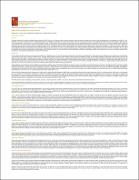| dc.description.abstract | This paper analyzes the complex interrelation between poverty and AIDS. Poverty, in its many and diverse aspects and with its many and diverse consequences, creates a fertile breeding ground for the expansion of HIV/AIDS. In turn, HIV/AIDS, for its mode of transmission and its epidemiological features, badly affects the livelihood of its victims, their families, their entire communities and countries. Sub Saharan Africa bears the brunt of the epidemic. With about 10% of the world population, it has about 66.5 % of the world seropositive cases. In three Southern African countries the HIV prevalence in the adult population reaches or exceeds the level of 30 %. Recent WHO estimates put life expectancy in Sub Saharan Africa at about 47 years and that, without AIDS, it would be at about 62 years. The development achievements of the last decades risk being lost and the future of the continent is at risk. But numbers, alone, don’t tell the whole story. They don’t talk of millions of orphans, dilapidated health services, crumbling educational systems, illiteracy, gender discriminations, harmful cultural practices, uncontrolled urbanization, conflicts and civil wars, refugees and internally displaced people, entire economies on the verge of collapsing. In the rich countries, AIDS is no more a death penalty. It is a chronic disease that, although with problems, can be treated. For years the idea that the poor "had to be" excluded from the benefits of Antiretroviral Treatment (ART), simply because they are poor, has been accepted somehow passively. Things are now changing. The paper briefly touches upon ART and its implications. It is also stated that all deaths due to poverty and deprivation are unacceptable, not just those due to AIDS. The main conclusion is that the fight against HIV/AIDS is the fight against poverty. The resources to win this war are not lacking. What seems to be lacking are vision, political will and genuine interest in all human beings. | en_US |



